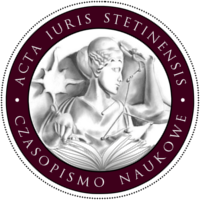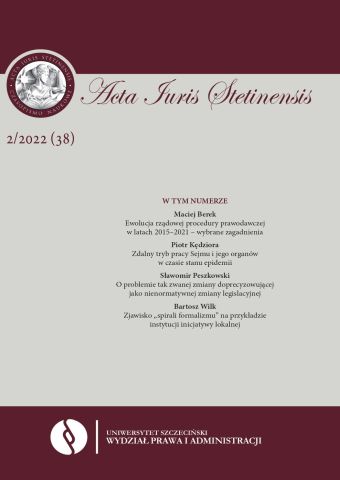







| Authors: |
Andrzej
Gross

Uniwersytet Szczeciński |
| Keywords: | a precedent in the Polish legal system established jurisprudence the role of judgments in Polish law |
| Data publikacji całości: | 2022 |
| Page range: | 13 (109-121) |
| Downloads ?: | 294 |
| 1. | Flemming-Kulesza T., Czy w Polsce możemy mówić o prawie precedensowym?, w: A Śledzińska-Simon, M. Wyrzykowski (red.), Precedens w polskim systemie prawa, Warszawa 2010. |
| 2. | Leszczyński L., Praktyka precedensowa w porządku prawa stanowionego – podstawowe czynniki warunkujące, „Przegląd Prawa i Administracji” 2017, nr 110. |
| 3. | Leszczyński L., Precedens sądowy w polskim porządku prawnym, Warszawa 2018. |
| 4. | Łętowska E., Czy w Polsce możemy mówić o prawie precedensowym, w: A. Śledzińska-Simon, M. Wyrzykowski (red.), Precedens w polskim systemie prawa, Warszawa 2010. |
| 5. | Morawski L., Czy precedens powinien być źródłem prawa?, w: J. Malarczyk (red.), W kręgu problematyki władzy, państwa i prawa. Księga jubileuszowa w 70-lecie urodzin Profesora Henryka Groszyka, Lublin 1996. |
| 6. | Leczenie sądów, „Newsweek” z 4 listopada 2007 r. |
| 7. | Sanetra W., Swoboda decyzji sędziowskiej z perspektywy Sądu Najwyższego, „Przegląd Sądowy” 2008, nr 11–12. |
| 8. | Stawecki T., Precedens jako zadanie dla nauk prawnych, w: A. Śledzińska-Simon, M. Wyrzykowski (red.), Precedens w polskim systemie prawa, Warszawa 2010. |
| 9. | Stawecki T., Precedens w polskim porządku prawnym. Pojęcie i wnioski de lege ferenda, w: A Śledzińska-Simon, M. Wyrzykowski (red.), Precedens w polskim systemie prawa, Warszawa 2010. |
| 10. | Stawecki T., Precedens w polskim porządku prawnym, Warszawa 2008. |
| 11. | Tokarczyk R., Współczesne kultury prawne, Kraków 2001. |
| 12. | Winczorek J., Redundancja redundancji w uzasadnieniach Trybunału Konstytucyjnego, w: T. Giaro (red.), Rola orzecznictwa w systemie prawa, Warszawa 2016. |
| 13. | Wójtowicz K., Common Law, w: A. Rot (red.), Główne kultury prawne współczesnego świata, Wrocław 1995. |
| 14. | Wróblewski J., Precedens i jednolitość sądowego stosowania prawa, „Państwo i Prawo” 1971, z. 10. |
| 15. | Wróblewski J., Sądowe stosowanie prawa, Warszawa 1988. |
| 16. | Zajadło J., Precedens rzeczywisty i pozorny, czyli po co prawnikom filozofia prawa, w: A. Śledzińska-Simon, M. Wyrzykowski (red.), Precedens w polskim systemie prawa, Warszawa 2010. |
| 17. | Zdziennicki B., Znaczenie orzecznictwa Trybunału Konstytucyjnego dla umacniania pozycji władzy sądowniczej, w: T. Giaro (red.), Rola orzecznictwa w systemie prawa, Warszawa 2016. |